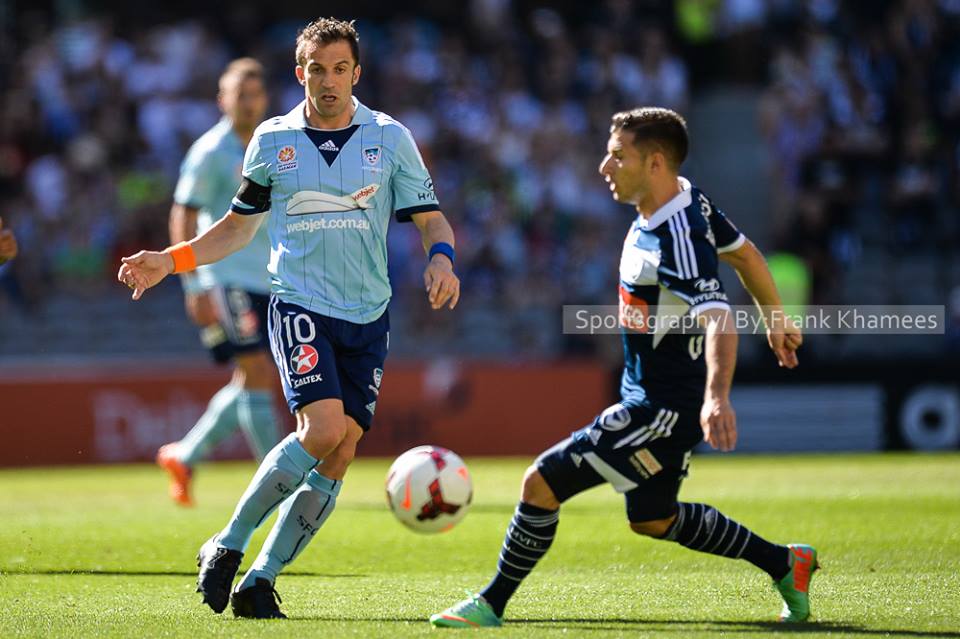After being thumped by Sydney 5-0 at home on Australia Day, Melbourne Victory is now the laughing stock of the competition. Factoring in the previous week’s loss to Wellington by the same scoreline, one of the better jokes doing the rounds at the moment is “what time is it? 10 past Victory”.
Sunday’s result was compounded by the ease in which Sydney (no world-beater this season either) managed to dominate Victory all across the park. Often lambasted for a lack of structure and coherence as a unit, a lowly Sydney was made to look like a genuine title challenger by a home side completely lacking desire.
Just two weeks ago, Victory was considered a title contender, sitting in third place and looking to mount pressure on the top two. Mind you, with the volatile nature of the A-league, they still may mount a late challenge. However, at this point in time, a demoralised Victory look more likely to drop out of the top six if things don’t turn around quickly.
Tactics without the ball
Part of the problem with Kevin Muscat’s side at the moment is the team setup when it doesn’t have possession. Too often the Sydney players were able to maintain possession easily, without being pressed by Victory, allowing them plenty of space and time to string passes together at ease. They were allowed to retain the ball and play through Victory’s midfield without any pressure. This is where Victory really miss Mark Milligan. Whilst Leigh Broxham is a defensive-minded player, both Rashid Mahazi and James Jeggo seem incapable of doing the donkey work to read the game and harass attackers, breaking up play and winning the ball from the opposition before it can reach Victory’s back four. On Sunday, Sydney’s defenders could easily get the ball to their attackers, unopposed, or just waltz from defence to attack and score on their own, à la Sebastian Ryall.
Most importantly, when three of your back four are under the age of 21, it’s imperative they are provided adequate defensive cover. This is especially true when the opposition’s main attacking outlet is Alessandro Del Piero. However with Victory’s setup, (which leaves the front four in ‘cheating’ positions) relieved of defensive duties, Victory’s defenders were again left vulnerable. Dylan Murnane, in particular, struggled to cope with Del Piero’s genius, and was exposed on a number of occasions. Victory’s high defensive line, and lack of speed was also exposed early. Ranko Despotovic, who’s not exactly the fastest player on the pitch, was able to run onto long balls with ease, scoring a goal and winning a penalty in the first half.
Overall, Muscat has a lot of work to do to shore up his defence.
Tactics with the ball
In attack, Victory are also very predictable, making it simple for opposition teams to plot against. With the focus on possession and short passes, Victory players always look for the nearest option to pass to, until they get to their front third. That plan could work in theory, should all players be working in tandem within the system. However, on Sunday, Victory were blighted by a number of misplaced passes, players were unaware of the ball coming to them, and there was a lack of options present to pass to.
Again, the lack of plan B in Muscat’s game means teams can easily set-up defensively and suffocate the avenues Victory usually play through. When opposition teams press, and their attackers also track back to cut off the option of the easy pass in defence, Victory become stranded. This leads to countless turnovers in play before the ball can even reach the front four.
The stale style of play is compounded by a lack of creativity since Mitch Nicholls’ departure. Before Tom Rogic’s introduction on Sunday, there was nobody available for the home side to hold the ball and dictate play in the front third. Furthermore, the players in navy blue looked sluggish and scared to run and take on defenders. When the inexperienced fullbacks, Murnane and Jason Geria were presented with space out wide, they did not attempt to take the ball forward in quick fashion (which is Adama Traore’s strength). Rather, they looked to pass back straight to the middle, where the players were already heavily marked. The difference here was that whereas Sydney looked to get the ball forward before Victory could setup and defend, Victory were unable to do the same and were left stifled in attack.
Discipline
To accompany his lackluster defending, Adrian Leijer has also conceded nine yellow and two red cards this season, leading the competition with eleven cards in total. By comparison, the next worst is Kew Jaliens (Newcastle Jets) with seven yellows and one red; eight in total. Leigh Broxham is next for Victory with seven yellows, and Pablo Contreras is on six. Altogether, with 39 yellows and two red cards, Victory have the second worst discipline in the competition (to accompany their second worst goals conceded). Additionally, Victory have conceded five penalties this season, at a rate of almost one every three games, with only one not resulting in a goal. It’s costing goals at crucial times and leaving the team short of personnel week in, week out.
It also feels like one week Adrian Leijer is condemned for his defending, and praised the next. Such a poor showing of consistentcy is not good enough for a team wanting to challenge for the title. Leijer’s bad side was again on display on Sunday, with his lack of speed exposed by Ranko Despotovic (resulting in a penalty), and lack of mobility exposed by the rest. And that was just in the space of half an hour before he had to be stretchered off.
However, in addition to Leijer, the finger could just be pointed at anyone on the day. Nathan Coe was culpable of a goal, Kosta Barabarouses continues to frustrate with little impact on the wing, James Troisi has been off his game for a while now. With tonights tough away trip to Perth looming, Muscat will have his work cut out to get his team working in order. With Rogic’s introduction into the team, the players will once again benefit from a creative outlet. As for the defense, well that’s anybody’s guess.

